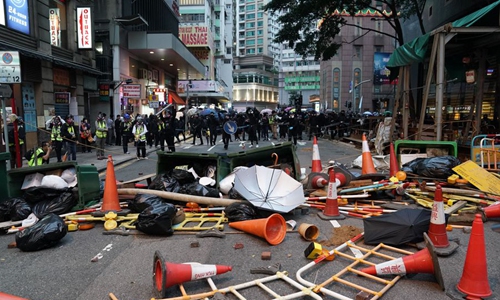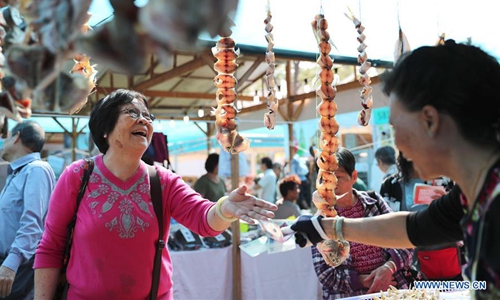HOME >> CHINA
HK rioters tired due to shortage of funding
By Yang Sheng Source:Global Times Published: 2020/1/19 20:23:40

Rioters set barricades with debris on streets to block traffic on Jan. 1, 2020 in Hong Kong, China. (Xinhua)
The Hong Kong turmoil has continued for more than seven months, and now, a few days ahead of Chinese New Year, many protesters and rioters have expressed their tiredness and sense of failure, with observers noting that due to the public desire to restore peace, firm law enforcement by the police and national sanctions against foreign forces, the source of chaos has been effectively contained.However, there is still occasional violence, especially during the weekends. On Sunday, illegal assemblies took place in the city, public facilities were damaged and unarmed police officers responsible for community liaison were attacked by rioters and seriously injured.
According to the Hong Kong Police's Facebook account on Sunday, "Since this afternoon, a large group of rioters have been inflicting damage to the vicinity of Chater Garden, Central, where a public event was taking place, by acts of arson, road blockage and even brutal attacks on Police Community Liaison officers who were then speaking with the event organizer."
"They [police officers] were suddenly surrounded and beaten up brutally by a large group of rioters with wooden sticks and other weapons. They were left with bloody head injuries. Such appalling acts are not to be condoned. The Police will endeavor to bring the assailants to justice."
Four males were arrested by the police after they were found to be in possession of hammers, spanners, extendible sticks, spray paint and gloves, said police on the Facebook account.
The scale of the illegal assemblies in Hong Kong is getting much smaller and the number of participants is dropping, said some Hong Kong residents. On LIHKG, a social media network frequently used by protesters to spread information to organize protests and riots, some protesters posted that they felt "disappointed" and "tired" because many of them are no longer motivated to join assemblies, protests and riots as they have "no more money to pay their bills if they don't go back to work."

A customer (L) shops at a fish pavilion at an outdoor farmers' market in Hong Kong, south China, Jan. 3, 2020. (Xinhua/Wu Xiaochu)
Victor Chan Chi-ho, a vice chairman of the Hong Kong Association of Young Commentators, told the Global Times on Sunday that radical protesters or rioters that prefer to use violence are no longer useful for the opposition camp, as they already won the District Councils Election in November 2019, so now they sense that they are being abandoned by their allies."Over the moths-long turmoil, the majority of people have become tired of the endless chaos, and no matter which side they might support, most of them would like to restore public order and continue with their lives. This is why the rioters and radical protesters felt disappointed," Chan said.
"They [rioters] were being used by foreign forces and politicians from the opposition camp, and now they have been abandoned and gained nothing," said a Hong Kong-based observer, 28, who asked to remain anonymous and used to participate in many protests in 2019 and is familiar with the operation of the opposition camp, adding that "While the opposition camp are enjoying the political benefits, many of the rioters were arrested and are in jail."
Many protesters said on LIHKG that they felt a "sense of failure" because many people around them wanted to get back to their "normal lives" rather than continually participate in illegal assemblies and protests.
Li Xiaobing, an expert on Hong Kong, Macao and Taiwan studies at Nankai University in Tianjin, told the Global Times on Sunday that "from the very beginning, foreign interference was the main reason why the turmoil could turn from normal protests to large scale and endless unrest. With foreign interference reduced, the participants and organizers will lose income and will not be able to stay motivated."
The Taiwan election is over now and the pro-secessionist Democratic Progressive Party and its candidate Tsai Ing-wen have won the election and got what they want by smearing the "one country, two systems" policy, so they won't maintain their input to sponsor anti-China activities, said Li.
The interference from the US still remains but is also being reduced, as the China-US phase one trade agreement has just been signed and the US also got something it wanted from using anti-China forces in Hong Kong to make trouble for China, Li noted.
Some Hong Kong residents also believe that the firm and effective law enforcement by the Hong Kong Police has also been crucial, because many rioters have been arrested and the anti-government forces have been effectively damaged.
"The central government is also playing a crucial role in the process. After China announced its sanctions against some NGOs that serve foreign forces to interfere in Hong Kong affairs, the difficulties for foreign forces in making trouble in Hong Kong have increased," Li noted.
But this is not the time to declare victory in ending violence and chaos, and more struggles are expected to come as the Legislative Council Election will take place this year, Li said. "The government of the Hong Kong Special Administrative Region (HKSAR) and the liaison office of the central government in the HKSAR should seize the opportunity and push reform to improve governance and reshape its image."
RELATED ARTICLES:
Posted in: HK/MACAO/TAIWAN